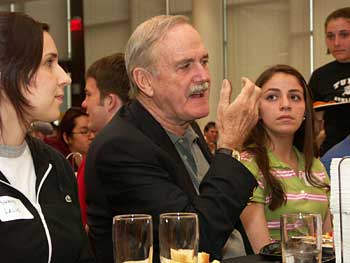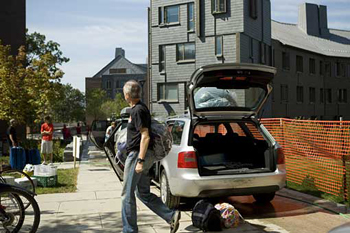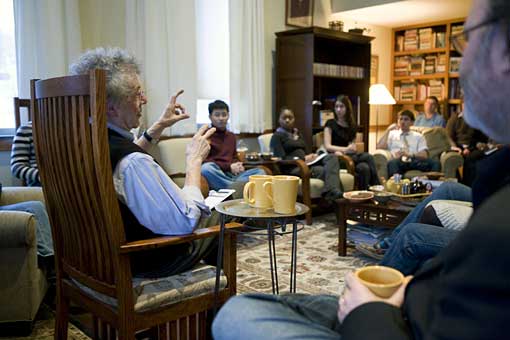CAMPUS LIFE
West Side Story: Removing barriers between living and learning

During his stay on campus as an A.D. White Visiting Professor, John Cleese chats with students.
In huge Cornell," says Professor Cindy Hazan, the first dean and house professor of Becker House, students can find "a home."
Hazan refers to the five residential houses on Cornell's West Campus, dramatic new structures accommodating about 350 students each that are designed to foster community, student-faculty interaction and learning outside the classroom. Politicians, artists, actors, scientists and journalists, among others, regularly visit the houses.
Each house bears the name of a prominent former Cornell faculty member. Alice Cook House opened in 2004, Carl Becker House in 2005, Hans Bethe House in 2007. The newest two houses, William T. Keeton House and Flora Rose House, admitted their first residents in August. Programming for the just-named Rose House will begin in fall 2009. Adjacent to the houses, a new Noyes Community Recreational Center has replaced its eponymous predecessor.
Ross Brann has been house dean and professor of Cook House since it opened, when he, his wife and their then high-school-age son moved in. He hosts residents and Cornell faculty at weekly teas. Also living in the houses are an assistant house dean, six graduate resident fellows and three student assistants. Another 30 or so Cornell faculty members visit as house fellows.
"The proximity to where students live and learn is what makes this program possible," says Brann, the Milton R. Konvitz Professor of Judeo-Islamic Studies and one of the key players in the faculty-led West Campus project. That proximity has provided him with opportunities to notice when students he would otherwise never have met are having academic or personal issues.
A female engineering sophomore, for example, was having difficulty adjusting to Cornell and was considering transferring to another university. Brann called Marjolein van der Meulen, a Cook House fellow and professor of engineering, and asked her to give the student some guidance. "Marjolein met with the student on a number of occasions and had dinner with her and her friends," says Brann. "This faculty intervention really helped turn around that student's experience at Cornell. She graduated last year."
In the informal house atmosphere, students are often open to advice on careers, fields of study and graduate school, says Brann. Cook House offers residents pre-law, pre-med and résumé workshops. Graduate resident fellows hold group tutorial sessions on organic chemistry and other subjects for students in all houses.
A prime advocate of the residential college concept since 1983, Isaac Kramnick, the Richard J. Schwartz Professor of Government, says the house system is succeeding in creating residence life that is not "an intellect-free zone. Students who are interested in their residential experience having intellectual and cultural dimensions deserve the option to realize that," he says.

Students move into the residential houses of West Campus in August.
Removing barriers between students' social and academic lives comports with Cornell's emphasis on "low walls" between disciplines.
"What we're looking for here is the partnership between students and faculty," Brann says. "Two years ago a group of students held a panel discussion between Catholic and Muslim students following the Pope's comments on Islam. Last semester, during the primaries, students spoke on behalf of each of the Republican and Democratic presidential candidates. It was a respectful conversation, even though there was strong disagreement."
A number of students say they were initially attracted by the houses' newness and amenities. Each house boasts its own library, dining room, common areas, late-night pantry, seminar room, laundry, television and computer rooms, music practice rooms and lobbies with mail service.
Brandi Jackson '10, a human development and pre-med major minoring in biomedical engineering, was elected president of the Bethe House council. Jackson's favorite event her council sponsored was a male beauty pageant in which contestants vied for the title "Mr. Bethe."
The small communities lead students to greater interaction, friendships and involvement in developing programming on subjects of shared interest, Jackson says, and the houses' dining rooms foster socialization. "It's really easy to become isolated when you're a college kid. A lot of us are far from home. I'm from Ohio, so to see the same people every day is comforting. You have people who you know are going to be there, people you can count on and have fun with, too."
For Jackson, face time with faculty is important. "It's one thing to go to hear an interesting lecture that piques your interest academically," she says. "But it's also nice to sit down and have a meal and talk to a professor. There's usually a barrier between students and faculty. My experience wouldn't have been the same without [Bethe House] Dean Porus [Olpadwala]. I was really lucky to hang out with him."

Professor Isaac Kramnick chats with Alice Cook House residents earlier this year.
House residents also invite professors to dinner on faculty nights. Alexandra Terrotti '10, who majors in government and Near Eastern studies, invited assistant government professor David Patel "because I knew he was new to Cornell and he's also my adviser. I thought it would be nice to get to know him better." Says Patel: "I think this is a fantastic idea. Cornell does a lot of activities like this where students and faculty members are able to interact outside the classroom. That's magnificent."
"It's not just faculty-student interaction or famous person-student interaction," notes Kramnick, who has served as a faculty fellow in Cook, Becker and Bethe houses. "It is the students' interactions among themselves. They see themselves as owners of these communities, and they are taking leadership roles in creating this new culture."
Brann says studies of student satisfaction with the West Campus experience "give us a sense that things are definitely moving in the right direction."
The houses have proven so popular that a lottery system has been instituted for sophomores who wish to remain in the houses in their junior or senior years.
"Anyone who spends an hour in those houses feels the excitement," says Kramnick. "The spirit, the ethos behind it. I think it is realizing what we hoped: a transformative experience for Cornell undergraduates in the 21st century."